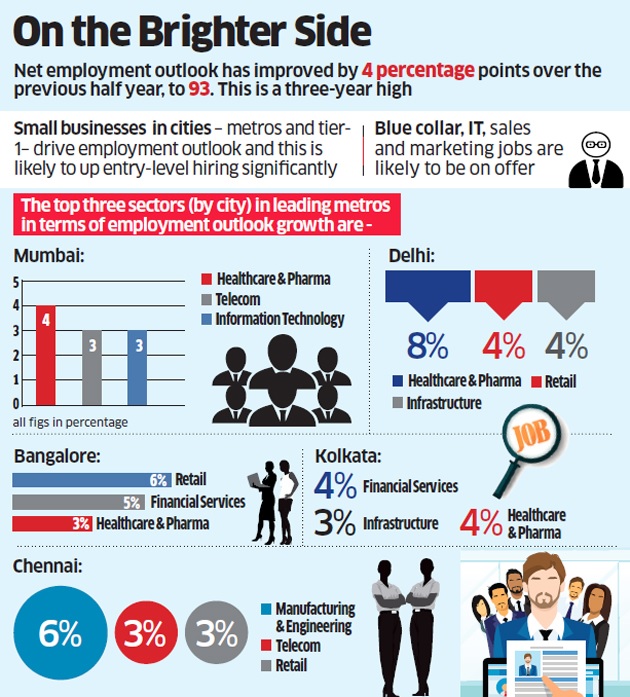The reports on how the job landscape looks are a little mixed – it depends on the countries, sectors and stages of unlock. In places where the lock-down has been fully lifted, hiring is seeing a rise (gradual, but rise nevertheless). In some countries the recovery has been flat, in others, it’s been encouraging. In the UK, for instance, employment has fallen by biggest quarterly number since 2009. This is part of trend where falls in employment is accompanied by reduced hours of work. Also, the fall is greatest in the youngest and oldest workers, and also with those in lower-skilled jobs.
And that’s one of the points that new graduates should make note of – the fact that upping skills is now critical to staying relevant and being employable. But, before we get to skills and what graduates can do, let’s complete the jobs-landscape story.
In the US, for the past three months jobs are being added. In July 1.8 million jobs were added, which was much lower than June, but they were higher than many economists had anticipated. And despite the gains and the fact that the unemployment rate fell to 10.2%, the US economy is still down some 13 million jobs (during the pandemic).
The truth is that while the pandemic has forced many organizations to cut jobs, there are some industries which are reaping the benefits of living in a post-pandemic world. There is definite growth in sectors like healthcare, online education, e-commerce and consumer goods.
In India, a recent Employment Outlook Report by TeamLease (HY-1 April – September, 2020-21), states that the hiring sentiment, that had fallen by 86% points from the earlier half of the year is now showing signs of improvement. Till the lock-down was partially lifted the hiring sentiment for the current half year (H1-April-Sept’20) was as at 11%. Now, it’s marginally gone up to 18%.
The study analyzed 21 sectors, all of which (except for travel and hospitality) showed positive outlook towards hiring. Some sectors are better than others. (note: hiring intent here means the percentage of hiring managers planning to recruit; it does not mean the volume of hiring).
Some key findings of the study
- Global Trends: Labour markets, worldwide, saw a steep fall, where Intent to Hire to fell by 68% – 79%. In the Americas the Intent to Hire was the lowest, at 8% (though this drop in intent is the lowest among the geographies). Europe was at 9%, Africa at 10%, the Middle-East at 11%, and APAC at 14%.
- India: Here the scenario is marginally better. The Intent to Hire recovered from 11% (which was during the lockdown period) to 18% for the current HY (April – September, 2020-21). However, this recovery is driven by bigger businesses looking to hire Blue Collar labour as well as leadership level talent, primarily in the metro and tier-1 cities.
Here’s a look at the sectors that are the most been to hire according to the study (it’ll help to male note of these and look in these areas for opportunities)

Based on what’s heading for recovery, where the pockets of growth are and sectors that are getting a push due to advancements in technology and reactions to Corona, here are some job functions that will see growth in the coming years. The maximum growth, unsurprisingly, is taking place in tech and related fields (here are some top tech companies that are hiring). Also, because there’s now a tech aspect to almost anything we do, most sectors have tech integration within their fields (so, if you’re in tech, there’s a lot happening).
Here’s a list of tech-related job functions that will see growth in the coming years (not in order of growth).
- Artificial Intelligence Engineer
- Big Data Specialist
- Data Scientist
- Internet of Things (IoT) Solutions Architect
- Digital Content Specialist
- Blockchain Engineer
- Cloud Architect
- Developers – Full-Stack, JAVA, PHP, Python
- Web Designers
- Graphic Designers
- Software Engineers
- Data Analysts
- Software and Applications Developers and Analysts
- Medical and Health Services Managers
- Computer Systems Analysts
- Biomedical Engineers
- Digital Transformation Specialists
- Information Technology Services
- Product Managers
- Computer Systems Analysts
- Computer and Information Systems Managers
- Financial Analysts
- Mobile Application Developer
- IT Support/Help Desk









![Best Universities in New Zealand for International Students [2025 Rankings]](https://tcglobal.com/wp-content/uploads/2025/09/Best-Universities-in-New-Zealand-for-International-Students-2025-Rankings-600x338.png)